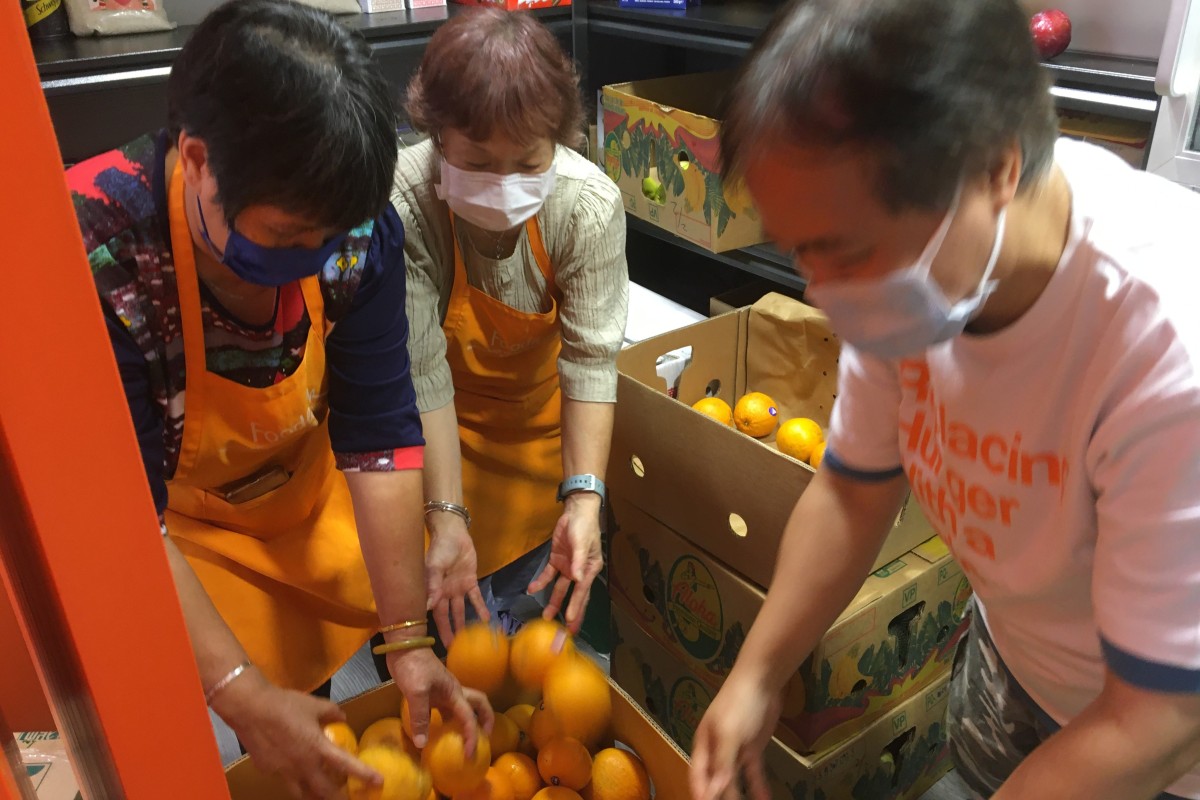
- NGO has teamed up with 80% of city’s top hotels and international school canteens to recover 566 tonnes of food each year
- More than 7 fully loaded Boeing 747 planes worth of edible and inedible food is dumped in city’s landfills every day
 The manager (right) of Foodlink Mart and two elderly beneficiaries, who are also volunteers, sort fruits delivered to the store from supermarkets. Photo: Cindy Sui
The manager (right) of Foodlink Mart and two elderly beneficiaries, who are also volunteers, sort fruits delivered to the store from supermarkets. Photo: Cindy SuiFoodlink Foundation, a charity, deploys its fleet of vans each morning to various supermarkets and retail chains across Hong Kong to collect food which would otherwise be wasted. Some of the types of food that they collect include soon-to-expire pasta and slightly bruised or overripe fruit.
Boxes full of fresh produce and packaged food are then delivered to Foodlink Mart, the charity’s 250 sq ft store located in a shopping centre in Kwun Tong.
The store’s manager and elderly volunteers work feverishly to unpack the boxes, placing the apples, oranges, bananas and other items on shelves to be given to people from low-income families, who drop by twice a week to pick up a bag of groceries free of charge.
“Because it’s a shop for them, it gives dignity back to them,” said Aurea Yung Yee-wah, the charity’s head of operations.
The charity opened the store in April after it received support from Operation Santa Claus (OSC) last year, an annual fundraising drive held by the South China Morning Post and public broadcaster RTHK.
Foodlink Foundation, which is dedicated to fighting hunger and food waste, is among the 15 charitable projects being funded by OSC this year. The support will help the group to continue providing food to about 3,600 people living in Kwun Tong.
Study Buddy (Explorer): Frugal elderly couple move hearts with donation
Recently, Yu, a 66-year-old retiree who only wanted to be identified by her surname, was given a bag of groceries with bread, rice, fruit and yogurt.
“It’s a big help to me,” said Yu, who lives on a monthly government subsidy of HK$4,000.
“At least we elderly people have more to eat now. Usually we don’t buy much because the prices are so high. For example, we wouldn’t think of buying yogurt.”
The store also provides retired elderly beneficiaries an opportunity to volunteer to give back to the community and increase their social interaction.
“They enjoy working there very much because they can regain self-esteem, contribute to society and help those less fortunate than them,” Yung said.
Founded in 2001, the charity collects safe-to-eat surplus food all over the city from its vast network of wholesalers, supermarkets, hotels, restaurants and canteens. It recovers 566 tonnes of food each year, including 72 tonnes of uncooked food.
In addition to collecting fresh produce and packaged items, it also picks up cooked food and delivers it directly to charities that serve meals to people from low-income backgrounds.
5 places to donate musical instruments in Hong Kong
The benefits of doing so were twofold – it combats hunger and also reduced the amount of waste that ended up in landfills, Yung said.
Every day, about 3,255 tonnes of edible and inedible food is dumped in Hong Kong’s landfills, most of which is household waste, according to Yung. This comprises 30 per cent of the city’s overall waste, the highest amount among all refuse categories.
“It’s more than seven fully loaded [Boeing] 747 planes,” she said.
Despite the significant amount of food waste, the number of people who sought support from Foodlink had increased since the Covid-19 pandemic, Yung noted.
About 1.65 million people, which includes one in four children and nearly half of all elderly people, would be living in poverty if they did not receive subsidies and benefits, according to a government report issued in 2020.
The poverty level in Hong Kong is defined as having a monthly income of less than HK$4,400 per person, HK$9,500 for a two-person household and HK$20,800 for a family of four.
The challenge Foodlink was facing was that it did not have enough surplus food, Yung said.
“The poor are getting poorer … Inflation is very high so you can imagine the difficulties vulnerable families are facing,” Yung said.
English camp in Hong Kong uses interactive learning to engage low-income pupils
She explained that hotels, schools and corporate canteens were operating under cost pressure and had less food to give away given the city’s economy had not fully recovered from the pandemic.
“We don’t want people to waste food, but we have more people who need help, so we need to keep finding new channels,” Yung said.
So far, Foodlink has partnered with 80 per cent of Hong Kong’s top hotels and international school canteens.
The charity’s goal was not to only to find additional sources of surplus food, but to expand the size of its store and open more to serve other neighbourhoods, such as Sham Shui Po and Kwai Chung, which had a large low-income population, Yung added.
She said she felt joy when she saw heartwarming scenes, such as a recent moment in which a little boy who had joined his father to pick up a bag of groceries was thrilled to get some candy, chips and crackers from the store.
“I feel very satisfied that I’m doing something good for society,” Yung said.
Since 1988, OSC has raised HK$369 million to support the Hong Kong community through 338 charitable projects. For more information on this year’s beneficiaries, please click here.